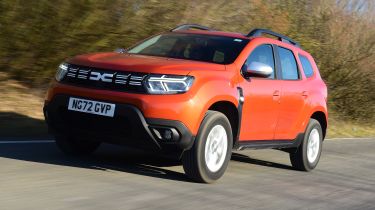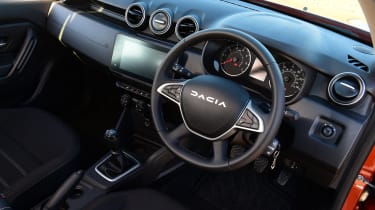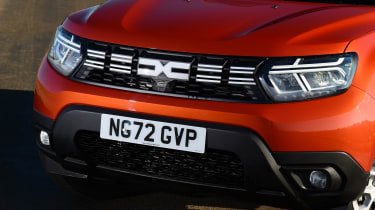Dacia Duster Expression 130 TCE petrol review
Dacia's latest updates aren't quite enough to hide the Duster's age, but it still offers tremendous value for money

Verdict
The Dacia Duster looks a lot smarter with Dacia’s fresh branding, and the new Expression trim we’ve tested here seems a sage choice, especially when paired with the 1.3-litre four-cylinder engine option. It’s largely the same as before otherwise, which is mostly a good thing. While starting to feel its age, the Duster is a practical compact SUV that’s surprisingly good fun to drive and exceptional value for money.
It hasn’t taken long at all to get used to Dacia’s new brand identity. In fact, the outgoing branding, which featured a shield-like logo, already looks a little old hat when spotted on more recent Dacia models made just before the switchover.
Current Dacias instead have the off-white ‘Dacia link’ logo, consisting of the letters D and C merging in the middle, on the front - and ‘D A C I A’ lettering on the boot in the same finish. Completing the look is a new grille for the updated badge to sit atop.
It gives the Duster a nice uplift in kerb appeal, to go with a rejigged range. Starting the trim level lineup is now the basic Essential, moving up to the Expression trim we’re testing here, then Journey and finally Extreme. Expression looks like a sound choice among all those - it’s not exactly brimming with gadgets, but it ticks all the right boxes.
Used - available now

2021 Dacia
Duster
11,920 milesManualPetrol1.3L
Cash £13,995
2022 Dacia
Duster
28,995 milesManualPetrol1.3L
Cash £14,995
2022 Dacia
Duster
30,755 milesManualDiesel1.5L
Cash £13,587
2023 Dacia
Duster
15,733 milesAutomaticPetrol1.3L
Cash £16,963The standard kit list includes rear parking sensors with a camera, remote central locking, automatic air conditioning, front and rear electric windows, 17-inch alloy wheels, and an eight-inch touchscreen infotainment system with smartphone connectivity, six speakers and DAB radio. And yet, it’s still a bargain, with this SUV coming with a supermini-like price tag. It’s available from £17,295 with the base 0.9-litre three-cylinder engine, or £18,645 if you want the punchier 1.3-litre unit fitted to our test car.
The revised lineup retains a focus on simplicity. The only options available on the Expression are paint colours (white is free, the other five hues are £650 each), and a spare wheel for £300.
Trim levels and branding aside, the Duster is no different than before, so the drive itself is more about reminding ourselves of what the value-conscious SUV does well, as well as its shortcomings. On the latter front, it’s worth noting the Duster is starting to feel a little dated, due to it using a much older platform than other cars in the Dacia stable.
The interior is a little gloomy, even if the new Dacia lettering on the steering wheel lifts things in the cabin slightly. Also, some trim parts - notably the inner door panels, which lack any padding on Expression trim - feel quite cheap. But there are no noticeable quality niggles, everything is well placed, and the infotainment screen is clearly laid out and easy to use. There are more responsive units around, but considering the price you’re paying here, it does the job just fine.
On the move, the Duster becomes a lot more cheery. It’s light for an SUV, tipping the scales at around 1,300kg, thus is keen to change direction and can even be quite fun to steer down a twisty road. There is a little bit of body roll, but nothing excessive, and while the steering doesn’t really give much in the way of feedback from the road surface, the weighting is good and the set-up feels natural enough.
Generous ground clearance means the Duster will be able to tackle some light off-roading if it needs to, although our test car was front-wheel drive. Only the diesel engine is available with an all-wheel drive system, and only in Extreme trim.
During day-to-day driving, the ride can be a touch stiff, often struggling to settle and taking bigger hits with more fuss than we’d like, but we wouldn’t the Duster’s suspension harsh. When moving at speed, there is a reasonable degree of wind and road noise, but it’s perfectly liveable.
The 1.3-litre inline-four fitted to our test car still seems like the pick of the range. It’s barely any less economical than the much less powerful three-cylinder, but far smoother, particularly at idle, where the triple can send annoying shudders through the cabin. It’s also quite a bit more powerful, giving perfectly adequate performance, with the Duster in this form cracking the 0-62mph sprint in about 10.6 seconds. It can sound a bit unrefined at higher revs, but a healthy 240Nm available from just 1,600rpm ensures you don’t often need to explore the unit’s upper reaches.
As always, it’s the amount of space you’re getting that impresses the most with the Duster. The interior as a whole feels spacious, with a good amount of rear legroom considering the car’s modest footprint. We’ve no complaints about the boot space either, as 467 litres is offered, while dropping the rear seats - which fold in a 60/40 split increases this to 1,623. There is a fairly big lip, though, which could make loading bulky items a little more difficult.
| Model: | Dacia Duster Expression 130 TCE 4x2 |
| Price: | £18,645 |
| Engine: | 1.3-litre 4cyl petrol |
| Power/torque: | 128bhp/240Nm |
| Transmission: | Six-speed manual, front-wheel drive |
| 0-62mph: | 10.6 seconds |
| Top speed: | 120mph |
| Fuel economy: | 49.6mpg |
| CO2: | 168g/km |
| On sale: | Now |
Now read our list of the best off-road cars...










